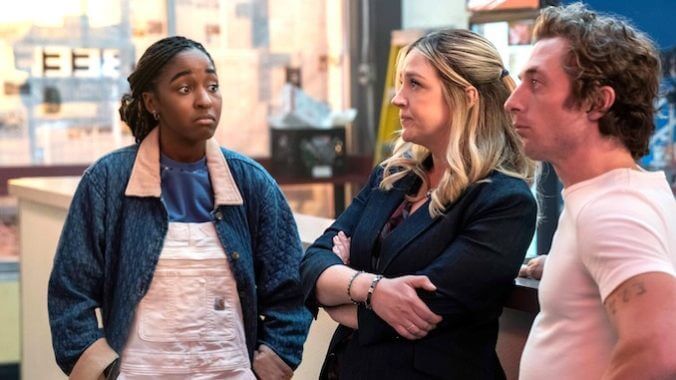It’s Not Category Fraud, The Bear Is a Comedy
Photo Courtesy of FX
If you have watched the TV awards circuit over the last couple of years, you have surely seen the ever-happening discussion over whether or not The Bear belongs in the comedy category. This tweet is one of the more recent ones to make the rounds in the wake of the show’s successful run at this year’s Golden Globes, but a simple keyword search of “why the bear comedy” is enough proof that there is a large group of people who don’t get why it’s categorized the way it is, and another group of people who are less than happy that it’s taking the glory from shows they believe are “actual comedies.”
Television that toes the line between comedy and drama is not a new Hollywood phenomenon. In recent years, The Flight Attendant was consistently nominated in comedy categories at major awards shows all while it had one foot solidly in the thriller-drama genre. The comedy elements are much more forward than they are in The Bear, but that does not take away from the incredibly dark elements explored in the series. Cassie’s (Kaley Cuoco) alcoholism and deeply-rooted trauma from her past and present are thoughtfully explored in every episode—in between whatever shenanigans she and the other characters have going on. In all honesty, the audiences’ reactions to The Bear landing in this category matched my own reaction to The Flight Attendant’s position as a comedy in the awards circuit, but upon reflection, it’s clear that the series exists in both worlds. The murder and tension and trauma are integral to the show, but Cassie’s recklessness and inability to handle the situation she doesn’t even remember getting herself into are played as comedic relief to the horrible events unfolding around her, and the dichotomy balances the show out so that you can have a good time amidst the trauma and heartache.
The Bear functions in the same way. Carmy’s (Jeremy Allen White) life is a disaster, his family is a disaster, and his dead brother’s restaurant is a disaster, but in between all of his trauma and anxiety and anger issues are obvious comedic beats that you would have to fast-forward through to miss. Even in just the first episode, Carmy believes UPS is a culinary institute on Sydney’s (Ayo Edebiri) resume, followed by Richie’s (Ebon Moss-Bachrach) “Merry Christmas, Lizards” monologue to round-off that first outing. There are multiple other bits woven into the episode, several of which become recurring jokes throughout the first season. Sure, as a former food service worker, seeing Sydney struggle with a container of veal stock she was doomed to drop had me wanting to pull my hair out, but that doesn’t take away from the absurd hilarity of Carmy and Richie getting into a physical fight over an inflatable hot dog, all while Tina (Liza Colón-Zayas) takes out the trash in the background.
Two episodes are regularly referenced when people say that The Bear should be getting nominated for drama awards: “Review” and “Fishes.” As the seventh episode in the show’s first season, “Review” is famous for being shot in a single take, something that landed creator and co-showrunner Christopher Storer an Emmy nomination for Outstanding Directing for a Comedy Series. “Review” is undoubtedly the most stressful episode of The Bear’s first season—it took me 4 hours to get through its painful 20-minute runtime—but it is far from lacking in the humor department. Richie telling Sydney, “You don’t need to swear at me like a maniac,” in the dead-center of their episode-long argument that ends in him backing into a knife she’s holding is an incredible and chaotic way to resolve a season’s worth of volatile tension building between the pair. The episode as a whole is a nightmare to watch because it’s so real, but the bad things that happen are not emotionally devastating. “Review” is the dictionary definition of a comedy of errors, with a cast of characters that is designed to handle that situation in the worst way possible. Everyone manages to do the wrong thing at the worst time and they are in a situation that was never going to be manageable in the first place. The comedy is in the chaos of the disaster the characters face, and while that’s not what a traditional comedy is known for (like its sitcom peers, for example), it doesn’t mean that it isn’t comedy.
-

-

-

-

-

-

-

-

-

-

-

-

-

-

-

-

-

-

-

-

-

-

-

-

-

-

-

-

-

-

-

-

-

-

-

-

-

-

-

-








































